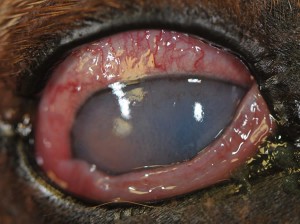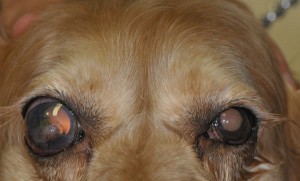What is glaucoma?
Glaucoma is an eye disease in which the intraocular pressure (IOP) is abnormally high. It can affect many different species of animals. Left untreated, it can result in ocular pain and irreversible blindness for the animal.
The cause of the glaucoma may be primary (caused by abnormal drainage angle) or secondary (caused by cataracts, lens displacement, inflammation, trauma or cancer in the eye). Regardless of the underlying pathology, glaucoma results in vision loss.
What dog breeds are predisposed to primary glaucoma?
Primary glaucoma is a condition that occurs mainly in purebred dogs. Breeds predisposed to primary glaucoma include cocker spaniels, many of the terrier breeds, poodles, beagles, chow chows and bassett hounds. However, primary glaucoma has been diagnosed in mixed-breed dogs as well. Primary glaucoma usually occurs in one eye at first, but eventually develops in both eyes.
What are the clinical signs of glaucoma?
The white parts of the globe (the sclera) become red, the clear front part of the eye (the cornea) turns bluish-white in color, and the pupil may be dilated (Figure 1).
Importantly, and sometimes after only a short period of time, the pet will suffer irreversible damage to the eye and lose sight. For these reasons, glaucoma is considered an ocular emergency. If glaucoma is not treated in a timely manner, the eye may also enlarge (Figure 2).
How will you diagnose glaucoma in my dog?
Glaucoma is diagnosed by measuring the intraocular pressures with tonometry. During tonometry, an instrument, such as a TonoVet or a TonoPen, is used to measure the IOP. The normal range for the IOP in dogs is 12 to 25 mmHg. Both eyes should be similar in intraocular pressure measurement.
A veterinary ophthalmologist will also use a technique called gonioscopy to further evaluate your pet’s eye and help determine if both eyes should receive immediate treatment.
How is glaucoma treated?
Working together with your primary care veterinarian, veterinary ophthalmologists strive to preserve vision and restore ocular comfort in all of our patients affected with glaucoma.
In glaucoma patients who receive prompt and appropriate veterinary care and who are still visual at the time of examination, a combination of medical and surgical treatments are typically recommended in an effort to maintain a normal IOP and to preserve vision. Medical treatment is long-term. A laser surgery may also be performed to control the IOP. In patients that are blind due to chronic glaucoma, the goal is to make the patient comfortable, typically with surgery.
If your pet’s eye looks abnormal, we encourage you to seek veterinary medical advice.





